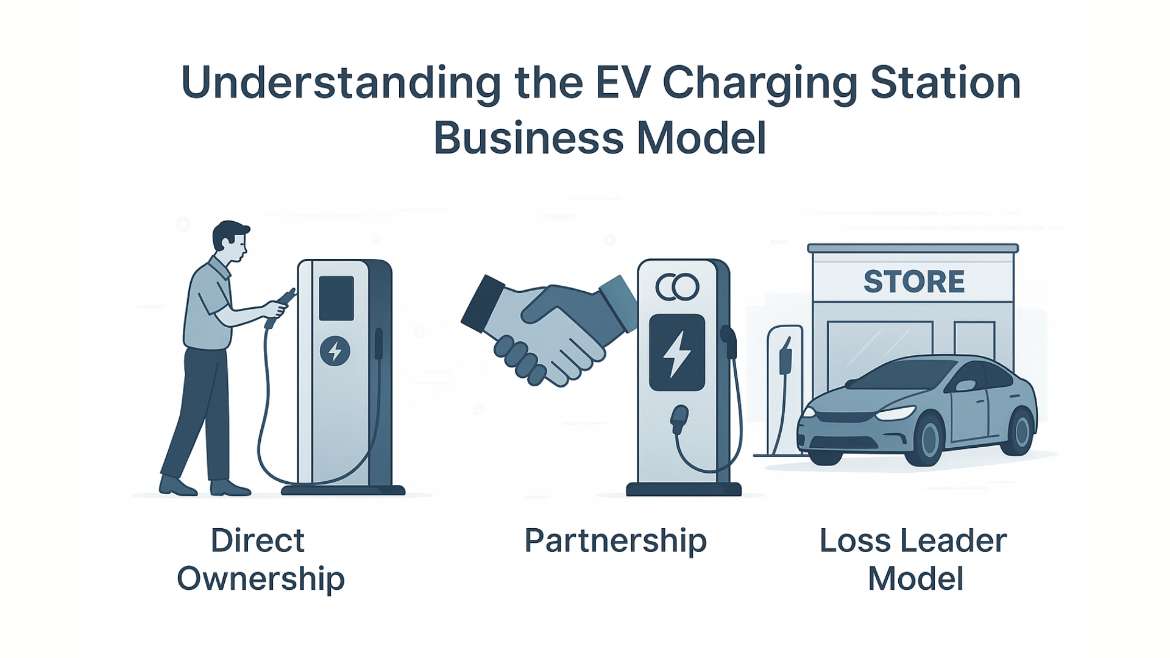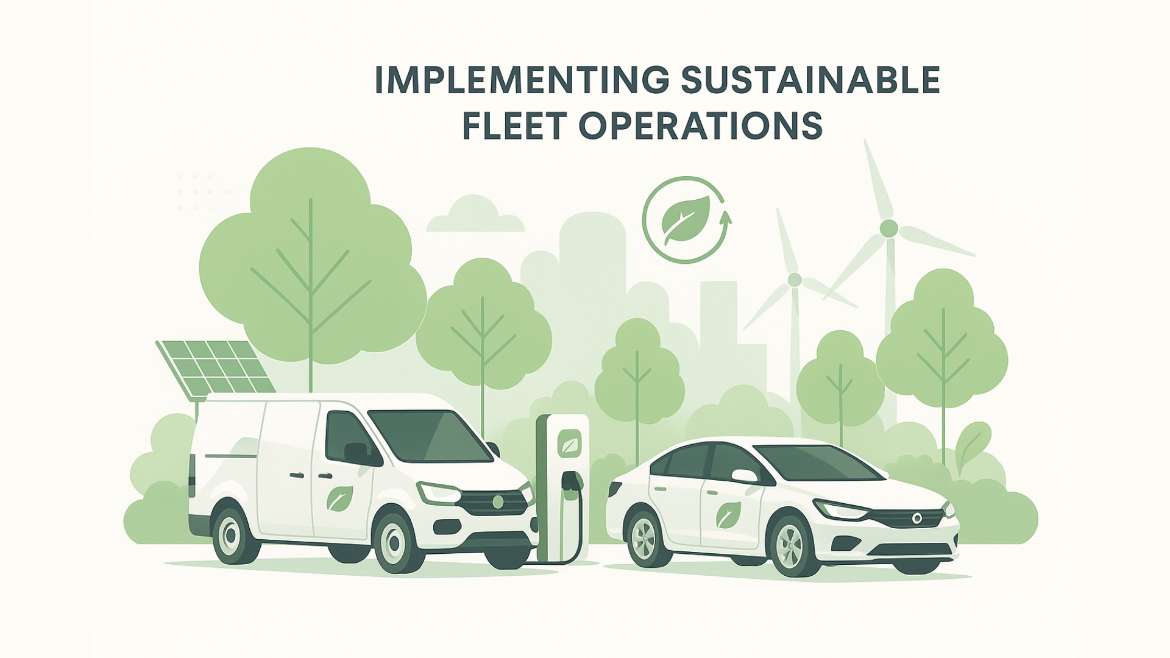Introduction
By 2025, Electric Vehicles (EV) are projected to account for up to 30% of new vehicle sales globally. This transformative shift in the automotive industry has unlocked a multitude of opportunities for businesses, particularly in the sphere of EV charging stations. As Charge Point Operators (CPOs) and Fleet Operators, you might be examining this burgeoning industry and wondering, “How can I create a profitable EV charging station business model?”
In this comprehensive guide, we’ll delve into the intricate world of EV charging stations, dissecting the most successful business models, key profitability considerations, and how to navigate the dynamic landscape of this rapidly growing industry.
Understanding the EV Charging Station Business Model

The initial step toward crafting a profitable EV charging station business is gaining a thorough understanding of the different types of business models available.
Starting an EV charging station business in India can involve several models. Direct ownership involves businesses purchasing and installing EV chargers, then managing operations and pricing themselves. This approach offers the highest degree of control but demands a substantial initial investment and ongoing maintenance costs.
In the partnerships and collaborations model, businesses partner with EV charging service providers to install and manage charging stations. This reduces the upfront cost and operational burden but also means sharing the revenue.
Some businesses use the loss leader model to attract customers to their primary business. In this model, charging may be provided at a low cost or even free, with the business making its profit from increased footfall to its main operations.
Each of these models has its unique advantages and challenges. The best fit for your business depends on factors such as financial capacity, business objectives, and customer base.
Key Considerations for Your EV Charging Business Model
To ensure the profitability of your EV charging station business, there are some key considerations to keep in mind.
Installation and hardware costs are a substantial part of the initial investment for setting up an EV charging station. You’ll need to factor in the cost of charging hardware, installation, and any necessary site upgrades, as explained in the steps to establish your own EV charging station business in India.
Regular maintenance is essential to keep your charging station operational and safe. This includes costs for inspecting and servicing the hardware, managing software updates, and addressing any repairs or vandalism. Leveraging fleet EV charger management software can streamline these processes.
Competitive pricing is critical to attract customers while ensuring your prices cover costs and provide a return on investment. Making profit from electric vehicle charging stations relies on understanding the local market and your operating costs when setting your prices.
In addition to direct revenue from charging services, consider other potential income sources. Smart CMS for every EV charging station franchise can help you unlock revenue streams such as partnerships with local businesses, advertising on your charging station, or offering premium services like reserved parking or faster charging.
The Role of Incentives and Regulations
Government incentives and regulations can also play a significant role in the profitability of your EV charging station business. Many regions offer financial incentives for installing EV charging stations, which can help offset your initial investment. On the regulatory side, there may be requirements around pricing, accessibility, and payment methods that you’ll need to consider in your business model.
Looking Ahead: Trends for 2025 and Beyond
As EV adoption continues to grow, so too will the demand for charging stations. Businesses that can offer convenient, fast, and competitively priced charging will be well-positioned to capitalize on this trend.
One emerging pattern is the integration of EV charging stations with other business models, like convenience stores or restaurants. Insights from EV charging station design and comprehensive guides to EV charging management systems can make charging a more attractive proposition for customers.
Leveraging Technology for Fleet Management
In this digital age, a strategic approach to EV fleet management and software solutions is to leverage technology. Several technologies can help CPOs and fleet operators optimize their operations. For instance, telematics systems provide real-time data on vehicle location, fuel usage, speed, and driver behavior. This data can be used to make informed decisions about routing, driver training, and vehicle maintenance.
Predictive analytics software can help fleet managers anticipate and address potential issues before they become costly problems. Data from telematics systems can be analyzed to predict when a vehicle is likely to require maintenance, helping avoid breakdowns and reduce downtime.
Implementing Sustainable Fleet Operations

Sustainability is becoming increasingly important in the transport sector. Many companies are looking to reduce their carbon footprint and improve their green credentials. For fleet operators, this means implementing more sustainable operations.
Fleet operators can invest in electric or hybrid vehicles. While these may have a higher upfront cost, they can offer significant savings in terms of fuel and maintenance. Many governments also offer incentives for companies that switch to greener vehicles.
Policies to encourage more efficient driving can also help. Using cloud-based EV charging software to optimize charging and energy use can further reduce operational costs and environmental impact.
Ensuring Compliance with Regulations
Compliance with regulations is a critical aspect of fleet management. Regulations may relate to vehicle safety, driver hours, emissions standards, and more. Non-compliance can result in heavy fines and damage to a company's reputation.
Technology can help fleet operators ensure compliance. Electronic logging devices can automate the tracking of driver hours, helping ensure compliance with hours-of-service regulations. Maintenance management software can help ensure vehicles are maintained according to safety regulations.
Centralized Control and Reporting
When managing operations at scale, centralized control and reporting become crucial. A well-structured fleet management system provides real-time data and insights, giving you a birds-eye view of your entire fleet. Fleet management software can track metrics like fuel consumption, driver behavior, and vehicle maintenance, invaluable for decision-making and strategic planning.
Enhancing Safety and Compliance
A fleet management system can play a pivotal role in ensuring the safety of your vehicles and drivers. By monitoring driver behavior, the system can identify risky habits such as over-speeding, harsh braking, and rapid acceleration, providing feedback to help drivers improve and reduce the risk of accidents.
Fleet management systems also help ensure compliance with local and federal laws, such as tracking hours of service to prevent driver fatigue and avoid legal complications.
Cost Management
One of the key advantages of a fleet management system for CPOs and fleet operators is its ability to manage costs effectively. By monitoring fuel consumption and identifying inefficient routes, the system can significantly reduce fuel costs. It can also predict maintenance needs and prevent costly repairs by scheduling timely vehicle check-ups.
Conclusion
The EV charging station business presents a significant opportunity for CPOs and Fleet Operators. By understanding the different business models, considering key factors for profitability, and staying abreast of industry trends, you can develop a successful and profitable EV charging station business.
As the EV landscape continues to evolve, keep your finger on the pulse. Stay informed, be ready to adapt, and seize the opportunities that this exciting industry presents.
FAQ
How profitable is the EV charging station business model?
Profitability can vary widely depending on factors like your business model, pricing strategy, and the local market. However, with the right approach and careful planning, an EV charging station business can be highly profitable.
What are the biggest costs associated with running an EV charging station?
The most significant costs are typically the initial investment for installing the charging station and the ongoing costs for maintenance and operation.
How can I make my EV charging station more profitable?
There are several strategies to increase profitability, including offering premium services, partnering with local businesses, utilizing government incentives, and incorporating advertising.
What trends should I be aware of in the EV charging industry?
Key trends include growing EV adoption, increasing demand for fast charging, integration of charging stations with other businesses, and evolving government regulations and incentives.
How can I set competitive pricing for my EV charging services?
Research the local market to understand what competitors are charging, then consider your costs and desired profit margin to set your prices.


.jpeg)

.jpeg)



